'Dune' Disappoints
Dune has stunning visuals, a striking soundtrack, and great performances. But it has issues everywhere from its pacing, to its story, to its diverse representation.
Incluvie Foundation Gala - Learn More


Natasha Romanoff, the MCU’s first female hero, finally gets her solo movie over a decade after her first appearance. And it’s not enough. The movie is too little too late for most Marvel fans and it does Natasha the injustice of sidelining her in her first solo film. Black Widow‘s true purpose is not to look back at Natasha’s past, but to serve as a launchpad for Yelena. The name of the movie is Black Widow, but we aren’t talking about the Black Widow we all know — this movie is truly Yelena’s debut as the MCU’s next Black Widow.

The most promising and intriguing part of the movie is the opening sequence. In Ohio, a young Natasha and her seemingly normal family must leave when her parents (truly Russian spies) steal important U.S. intelligence. After escaping the country, Natasha and her younger “sister” Yelena are forcibly separated and returned to Dreykov, founder of the Black Widow program. The opening credits parallel real-life human trafficking and are the most haunting, risky thing I’ve seen Marvel do. Little girls scream and cry as they are dragged out of shipping containments, juxtaposed with a coldly calculating Dreykov as he points at girls, choosing which ones will live and die. Then the girls are brainwashed and trained to become assassins.
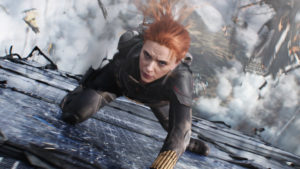
After this opening sequence is over, the movie changes. I was hoping the rest of the movie would be like those first few minutes — exploring the complex, hard-hitting reality of human trafficking. I expected too much. (This movie might have been better if it was in the same vein as the darker, grittier, more intimate Marvel Netflix shows). Instead, the movie returns to classic Marvel action sequences and spectacle that eclipse the nuanced topics it began to address. I had hoped we would see the gray moralities of the Black Widows. Instead, the movie gives them a copout: mind-controlling nanites. All of the new Widows are under mind control that Dreykov uses to remotely manipulate their bodies so they’re forced to do the things they don’t want to.

While I do appreciate the parallels to modern-day discussions about women’s bodily autonomy, this felt like a way to absolve everyone in the Black Widow program of responsibility. One of the things that makes Natasha such a compelling character is that she killed and was in control of herself. Interestingly enough, the thing that guilts her the most is not even something she did for the Red Room, but for S.H.I.E.L.D. — killing Dreykov’s daughter. I would have liked the movie to address that more in depth and discuss how S.H.I.E.L.D. did some pretty terrible things too, but the movie has clear-cut bad guys and good guys that it sticks to.
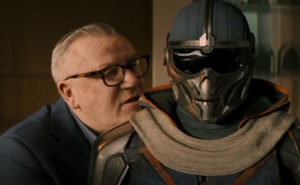
This is my main problem with the film: the way it paints characters as either bad or good. Like most Marvel movies, there seems to be no one left in a gray area — morality is either black or white. Dreykov is the villain. The entire movie centers on killing him, as if killing the one “big bad” will immediately solve all their problems. Dreykov was just one part of a system that exploits girls. Everyone else is automatically forgiven of any bad actions because they were “under his control.” The Black Widows and Taskmaster instantly become good as soon as they are exposed to the gas antidote. I would’ve liked to see some hesitate as Dreykov has been the only authority figure they’ve ever known.
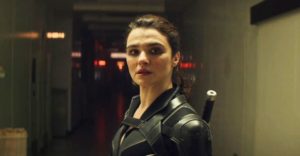
Melina and Alexei are also absolved of any responsibility for their actions even though they weren’t under nanite mind control. They were both complicit in a system that trafficked young girls. Yet they never apologize for what they did. And the movie centers them as heroes. Melina created the very nanites that strip girls of free will, including her surrogate daughter, and she is never once shown to be sorry for it. She claims she didn’t know what Dreykov was doing with it — a sorry excuse given that she knows Dreykov is in the business of controlling female assassins. Although she eventually turns against Dreykov, she doesn’t get nearly enough screentime to explore her struggles as an abuse victim who is brainwashed into helping her abuser abuse other women.

Meanwhile, Alexei is even worse. Throughout the film he is constantly centering himself. He complains about being bored in Ohio, much to Yelena’s understandable disgust. He is wistful over his glory days as the Russian superhero, the Red Guardian. He states that he views handing Natasha and Yelena over to a child trafficker as a great opportunity for success. Yet the movie paints him as a teddy bear and a redeemed father figure by the end. Alexei may ultimately admit that he loves the girls and regrets what he did, but he never apologizes and isn’t held accountable. His proclamation of love is overshadowed by how long he spent ignoring the girls’ trauma and complaining about his own shallow problems.

The best thing about this movie is Yelena and her sister bond with Natasha. Yelena is sarcastic, resolute, vulnerable, and traumatized — all things portrayed incredibly thanks to Florence Pugh’s acting. Pugh carries this movie and steals every scene she’s in, from teasing Natasha about being a “poser,” to going terribly in-depth about a hysterectomy, to discussing her first self-bought item: a vest, to calling her family out for burying the past she believed was real. Yelena is the true protagonist. She pushes the story forward with her determination to free the other Widows and gain closure from her family.
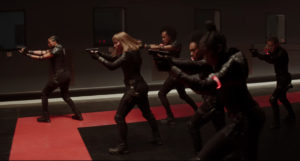
Another great thing about “Black Widow” is how the Widows are portrayed. None of the women are hypersexualized like Natasha was for most of her MCU appearances. All of the Widows wear practical bodysuits that cover everything. They have their hair up to keep out of their face when fighting. Every single one of them feels like a real, sympathetic character, even when they’re being puppeteered by Dreykov.
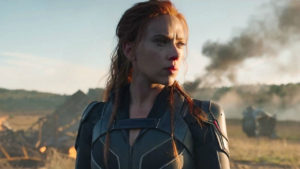
I believe many of the movie’s faults may stem from its screenplay, which is written by a man. You’d think a movie centering women, about the MCU’s first female hero, would be written by a woman. The script should have been penned by a woman who would have understood and portrayed women’s struggles more intimately and accurately than a man.
I did enjoy “Black Widow,” but it has many issues. I look forward to seeing more of Yelena in the MCU and expect them to treat her character with more respect than they did with Natasha.
Editor’s Note: This Incluvie score was changed to better reflect the lack of racial diversity in the film.
Related lists created by the same author
Dune has stunning visuals, a striking soundtrack, and great performances. But it has issues everywhere from its pacing, to its story, to its diverse representation.
Related movie/TV/List/Topic
Holiday hijinks ensue when a recently separated couple are both accidently invited to same holiday celebration.